初中英语语法知识—情态动词的综合训练
- 格式:doc
- 大小:39.00 KB
- 文档页数:7
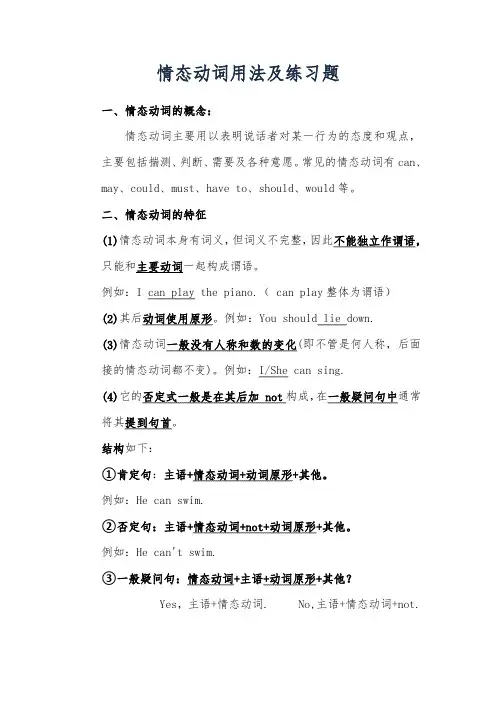
情态动词用法及练习题一、情态动词的概念:情态动词主要用以表明说话者对某一行为的态度和观点,主要包括揣测、判断、需要及各种意愿。
常见的情态动词有can、may、could、must、have to、should、would等。
二、情态动词的特征(1)情态动词本身有词义,但词义不完整,因此不能独立作谓语,只能和主要动词一起构成谓语。
例如:I can play the piano.( can play整体为谓语)(2)其后动词使用原形。
例如:You should lie down.(3)情态动词一般没有人称和数的变化(即不管是何人称,后面接的情态动词都不变)。
例如:I/She can sing.(4)它的否定式一般是在其后加 not构成,在一般疑问句中通常将其提到句首。
结构如下:①肯定句:主语+情态动词+动词原形+其他。
例如:He can swim.②否定句:主语+情态动词+not+动词原形+其他。
例如:He can't swim.③一般疑问句:情态动词+主语+动词原形+其他?Yes,主语+情态动词. No,主语+情态动词+not.例如:-Can he swim?-Yes, he can. No,he can’t.④特殊疑问句:特殊疑问词+情态动词+主语+动词原形+其他? 例如: -What can he do ?-He can swim.三.情态动词的用法(1)can的用法①表示“能力”Can you sing?你会唱歌吗?②表示客观条件允许You can listen to music here.你可以在这里听音乐。
You can’t park your car here. 你不能在此停车③can用在否定句和疑问句中时,有时表示说话人的怀疑、惊异、或猜测:It can’t be true.这不可能是事实Can it be true?这可能是真的吗?④.can的搭配用法:A.as +adj./adv.+as one can/could “尽可能,尽量……”,如:The man took his child to the hospital as quickly as he could.这个男人尽可能快地将孩子送去医院。
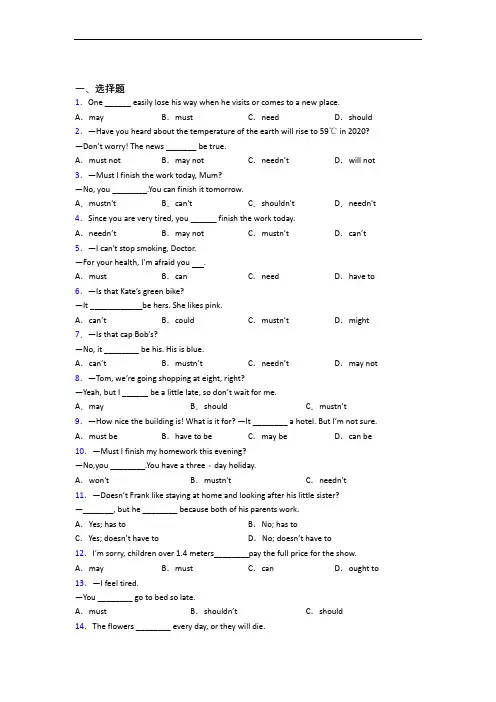
一、选择题1.One ______ easily lose his way when he visits or comes to a new place.A.may B.must C.need D.should 2.—Have you heard about the temperature of the earth will rise to 59℃ in 2020?—Don’t worry! The news _______ be true.A.must not B.may not C.need n’t D.will not 3.—Must I finish the work today, Mum?—No, you ________.You can finish it tomorrow.A.mustn't B.can't C.shouldn't D.needn't 4.Since you are very tired, you ______ finish the work today.A.needn’t B.may not C.mustn’t D.can’t 5.―I can't stop s moking, Doctor.―For your health, I'm afraid you .A.must B.can C.need D.have to 6.—Is that Kate’s green bike?—It ____________be hers. She likes pink.A.can’t B.could C.mustn’t D.might 7.—Is that cap Bob’s?—No, it ________ be his. His is blue.A.can’t B.mustn’t C.needn’t D.may not 8.—Tom, we’re going shopping at eight, right?—Yeah, but I ______ be a little late, so don’t wait for me.A.may B.should C.mustn’t 9.—How nice the building is! What is it for? —It ________ a hotel. But I’m not sure. A.must be B.have to be C.may be D.can be 10.—Must I finish my homework this evening?—No,you ________.You have a three﹣day holiday.A.won't B.mustn't C.needn't 11.—Doesn’t Frank like staying at home and looking after his little sister?—_______, but he ________ because both of his parents work.A.Yes; has to B.No; has toC.Yes; doesn’t have to D.No; doesn’t have to12.I’m sorry, children over 1.4 meters________pay the full price for the show. A.may B.must C.can D.ought to 13.—I feel tired.—You ________ go to bed so late.A.must B.shouldn’t C.should 14.The flowers ________ every day, or they will die.A.must water B.can be wateredC.should water D.must be watered15.-_________ you help me with my homework?-Of course if I __________.A.Could; could B.Can't; can C.Could; can D.Can; could 16.Will you please________them________the Birdwatching Society?A.inviting; join B.to invite; to join C.invite; to join D.to invite; join 17.—Mum, I’ve signed for a big box by Future Express (快递). What’s in it?—I’m not sure. I t ________be a present from your brother.A.need B.must C.may D.will 18.—Could you help me download some Taylor Swift’s songs from Ku Gou?—Sorry, people download music from the Internet without paying, because it’s against the law. A.wouldn’t B.needn’tC.mustn’t D.couldn’t19.一Already five people in the taxi, but the driver managed to take me as well.一Terrible, and it be an uncomfortable journey.A.can B.should C.must D.need20.---You look very pretty, if I say so.---Thanks a lot for saying that.A.must B.may C.will D.have to21.-Mum, must I stay there the whole day?-No, you__________. You__________ come back after lunch, if you like.A.mustn’t; can B.needn’t; must C.needn’t; may22.You __ drive your car so fast. It's very dangerous.A.wouldn't B.shouldn't C.couldn't D.mightn't【参考答案】***试卷处理标记,请不要删除一、选择题1.A解析:A【解析】【分析】【详解】句意:当一个人参观或来到一个新地方时可能很容易迷路。
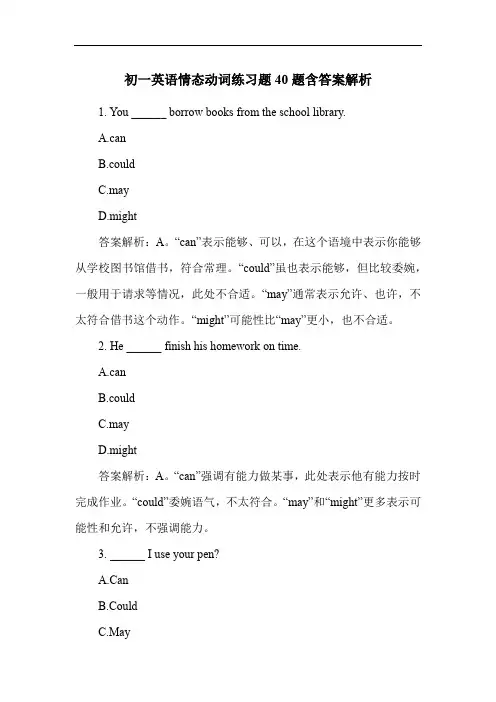
初一英语情态动词练习题40题含答案解析1. You ______ borrow books from the school library.A.canB.couldC.mayD.might答案解析:A。
“can”表示能够、可以,在这个语境中表示你能够从学校图书馆借书,符合常理。
“could”虽也表示能够,但比较委婉,一般用于请求等情况,此处不合适。
“may”通常表示允许、也许,不太符合借书这个动作。
“might”可能性比“may”更小,也不合适。
2. He ______ finish his homework on time.A.canB.couldC.mayD.might答案解析:A。
“can”强调有能力做某事,此处表示他有能力按时完成作业。
“could”委婉语气,不太符合。
“may”和“might”更多表示可能性和允许,不强调能力。
3. ______ I use your pen?A.CanB.CouldC.May答案解析:A 或C 都可以。
“Can I use your pen?”和“May I use your pen?”在请求别人允许时都可以用。
“could”和“might”语气更委婉,但不如“can”和“may”常用。
4. She ______ come to school early tomorrow.A.canB.couldC.mayD.might答案解析:C 或D。
“may”和“might”都表示可能性,此处表示她明天可能早点来学校。
“can”和“could”强调能力,不太符合语境。
5. We ______ listen to the teacher carefully in class.A.canB.couldC.mayD.might答案解析:A。
“can”表示能够、应该,在课堂上我们应该认真听老师讲课,符合语境。
“could”委婉语气,不太恰当。
“may”和“might”更多表示可能性和允许。
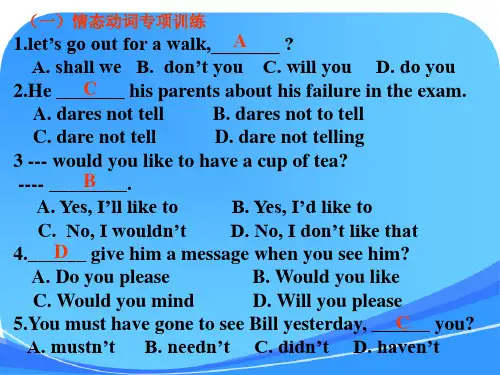
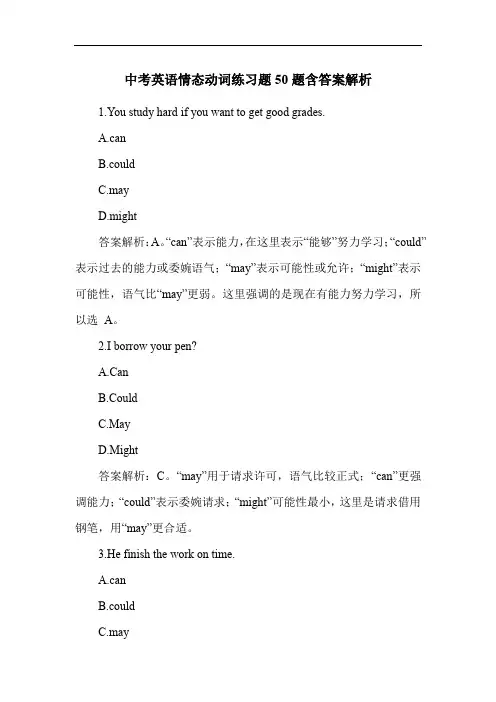
中考英语情态动词练习题50题含答案解析1.You study hard if you want to get good grades.A.canB.couldC.mayD.might答案解析:A。
“can”表示能力,在这里表示“能够”努力学习;“could”表示过去的能力或委婉语气;“may”表示可能性或允许;“might”表示可能性,语气比“may”更弱。
这里强调的是现在有能力努力学习,所以选A。
2.I borrow your pen?A.CanB.CouldC.MayD.Might答案解析:C。
“may”用于请求许可,语气比较正式;“can”更强调能力;“could”表示委婉请求;“might”可能性最小,这里是请求借用钢笔,用“may”更合适。
3.He finish the work on time.A.canB.couldC.may答案解析:A。
“can”表示能力,这里表示他有能力按时完成工作;“could”过去的能力或委婉语气;“may”表示可能性或允许;“might”可能性最小,这里强调能力,选A。
4. you help me with this problem?A.CanB.CouldC.MayD.Might答案解析:B。
“could”在这里表示委婉地请求帮助;“can”语气比较直接;“may”和“might”主要表示可能性和允许,不太符合语境。
5.She come to the party if she has time.A.canB.couldC.mayD.might答案解析:C。
“may”表示可能性,在这里表示她有可能来参加派对如果有时间;“can”表示能力;“could”过去的能力或委婉语气;“might”可能性比“may”更小。
6.We go to the park if it doesn't rain.A.canB.couldD.might答案解析:A。
“can”表示能够,这里表示如果不下雨我们能够去公园;“could”过去的能力或委婉语气;“may”表示可能性或允许;“might”可能性最小。
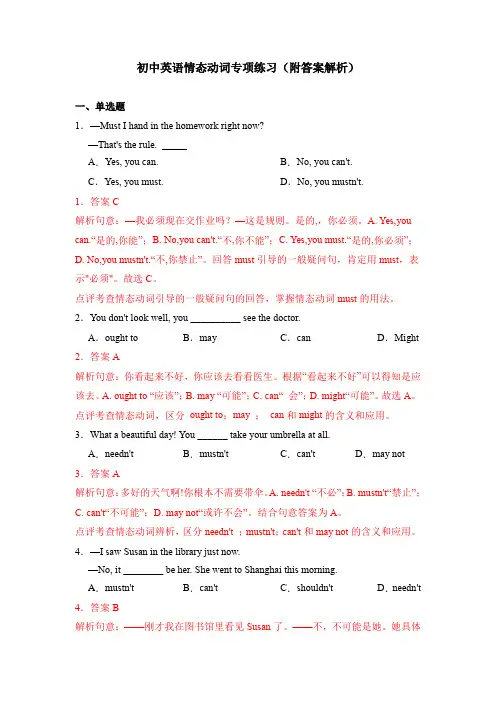
初中英语情态动词专项练习(附答案解析)一、单选题1.—Must I hand in the homework right now?—That's the rule.A.Yes, you can.B.No, you can't.C.Yes, you must.D.No, you mustn't.1.答案C解析句意:—我必须现在交作业吗?—这是规则。
是的,,你必须。
A. Yes,you can.“是的,你能”;B. No,you can't.“不,你不能”;C. Yes,you must.“是的,你必须”;D. No,you mustn't.“不,你禁止”。
回答must引导的一般疑问句,肯定用must,表示"必须"。
故选C。
点评考查情态动词引导的一般疑问句的回答,掌握情态动词must的用法。
2.You don't look well, you __________ see the doctor.A.ought to B.may C.can D.Might 2.答案A解析句意:你看起来不好,你应该去看看医生。
根据“看起来不好”可以得知是应该去。
A. ought to “应该”;B. may “可能”;C. can“ 会”;D. might“可能”。
故选A。
点评考查情态动词,区分ought to;may ;can和might的含义和应用。
3.What a beautiful day! You ______ take your umbrella at all.A.needn't B.mustn't C.can't D.may not 3.答案A解析句意:多好的天气啊!你根本不需要带伞。
A. needn't “不必”;B. mustn't“禁止”;C. can't“不可能”;D. may not“或许不会”。
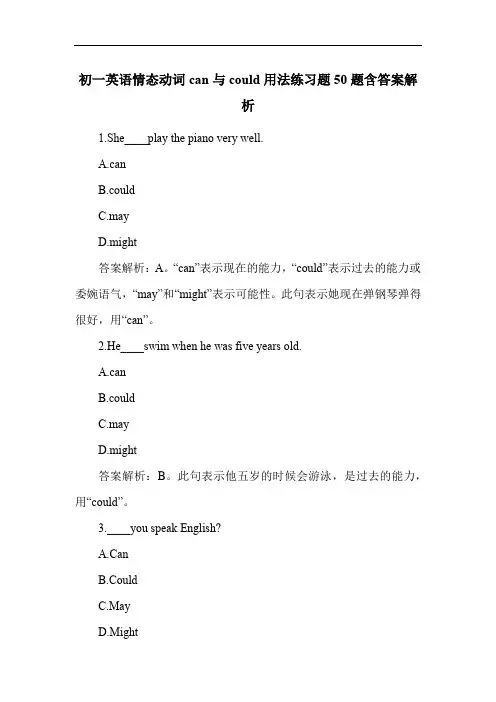
初一英语情态动词can与could用法练习题50题含答案解析1.She____play the piano very well.A.canB.couldC.mayD.might答案解析:A。
“can”表示现在的能力,“could”表示过去的能力或委婉语气,“may”和“might”表示可能性。
此句表示她现在弹钢琴弹得很好,用“can”。
2.He____swim when he was five years old.A.canB.couldC.mayD.might答案解析:B。
此句表示他五岁的时候会游泳,是过去的能力,用“could”。
3.____you speak English?A.CanB.CouldC.MayD.Might答案解析:A。
此句询问现在是否有说英语的能力,用“can”。
4.I____help you with your homework.A.canB.couldC.mayD.might答案解析:A。
表示现在有帮助做家庭作业的能力,用“can”。
5.____she dance beautifully?A.CanB.CouldC.MayD.Might答案解析:A。
询问现在是否有优美跳舞的能力,用“can”。
6.They____play football after school.A.canB.couldC.mayD.might答案解析:A。
表示现在放学后有踢足球的能力,用“can”。
7.____he ride a bike last year?A.CanB.CouldC.MayD.Might答案解析:B。
询问去年是否有骑自行车的能力,是过去的能力,用“could”。
8.We____go to the park on Sunday.A.canB.couldC.mayD.might答案解析:A。
表示在周日有去公园的能力,用“can”。
9.____you sing a song for us?A.CanB.CouldC.MayD.Might答案解析:A。
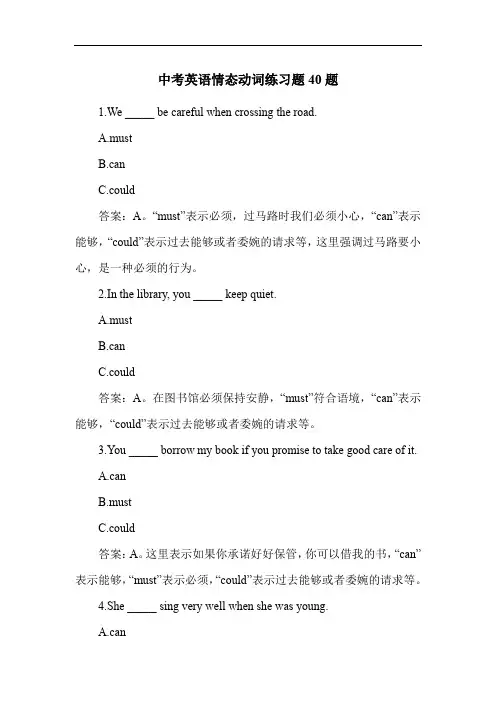
中考英语情态动词练习题40题1.We _____ be careful when crossing the road.A.mustB.canC.could答案:A。
“must”表示必须,过马路时我们必须小心,“can”表示能够,“could”表示过去能够或者委婉的请求等,这里强调过马路要小心,是一种必须的行为。
2.In the library, you _____ keep quiet.A.mustB.canC.could答案:A。
在图书馆必须保持安静,“must”符合语境,“can”表示能够,“could”表示过去能够或者委婉的请求等。
3.You _____ borrow my book if you promise to take good care of it.A.canB.mustC.could答案:A。
这里表示如果你承诺好好保管,你可以借我的书,“can”表示能够,“must”表示必须,“could”表示过去能够或者委婉的请求等。
4.She _____ sing very well when she was young.A.canB.couldC.must答案:B。
表示她年轻时能够唱歌很好,“could”表示过去能够,“can”表示现在能够,“must”表示必须。
5.We _____ finish our homework on time.A.mustB.canC.could答案:A。
我们必须按时完成作业,“must”符合语境,“can”表示能够,“could”表示过去能够或者委婉的请求等。
6.You _____ come to my party if you are free.A.canB.mustC.could答案:A。
如果你有空,你可以来我的派对,“can”表示能够,“must”表示必须,“could”表示过去能够或者委婉的请求等。
7.He _____ swim when he was five years old.A.canB.couldC.must答案:B。
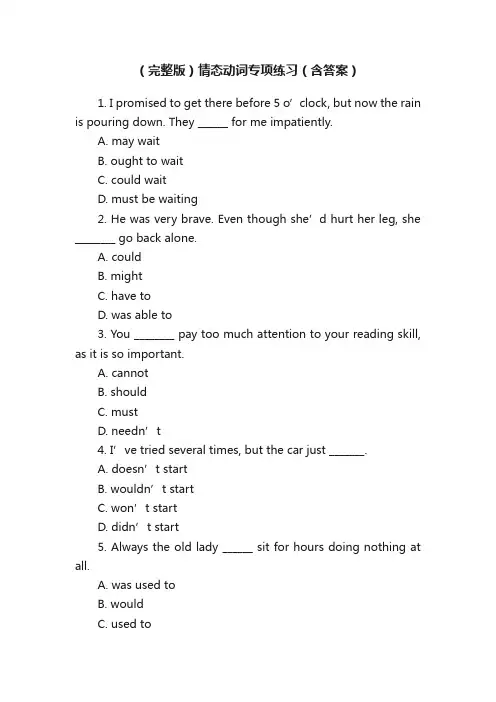
(完整版)情态动词专项练习(含答案)1. I promised to get there before 5 o’clock, but now the rain is pouring down. They ______ for me impatiently.A. may waitB. ought to waitC. could waitD. must be waiting2. He was very brave. Even though she’d hurt her leg, she ________ go back alone.A. couldB. mightC. have toD. was able to3. You ________ pay too much attention to your reading skill, as it is so important.A. cannotB. shouldC. mustD. needn’t4. I’ve tried several times, but the car just _______.A. doesn’t startB. wouldn’t startC. won’t startD. didn’t start5. Always the old lady ______ sit for hours doing nothing at all.A. was used toB. wouldC. used toD. should6. There used to be a small school,___________?A. was thereB. wasn’t itC. usedn’t thereD. usedn’t it7. Our house is on the top of the hill, so in summer the wind _____ be pretty cold.A. mustB. canC. ought toD. need8. Haven’t I told you that you __________ have the ans wer tomorrow morning?A. willB. shallC. shouldD. would9. I’m surprised that he _______ in the match.A. should failB. should have failedC. would have failedD. may have failed10. Better go to see my sick colleague right now, ________I?A. hadn’tB. didn’tC. don’tD. won’t11. Sir, you ______ be hunting deer here, for they are preserved by the government.A. oughtn’t toB. can’tC. won’tD. needn’t12. Sorry I’m late. I ______ have turned off the alarm clock and gone back to sleep again.A. mightB. shouldC. canD. will13. —There were already five people in the car, but they managed to take me as well.— It __________ a comfortable journey.A. can’tB. shouldn’t beC. must have beenD. couldn’t have been14. To be on the safe side, we should fill up the tank now, because we ______ run out of gas on the way.A. canB. wouldC. mightD. should15. ____ three people who travel together, there _____ be at least one who ____ be my teacher.A. Between; can; willB. In; should; couldC. Among; will; mayD. Of; must; can16. —Could you lend me that book you ______ me aboutwhen I telephoned you?—No, I am sorry, I can’t. I gave it to a friend.A. were tellingB. would tellC. had toldD. had been telling17. —We need a person badly to think up such an idea.—_______ the new comer have a try?A. ShallB. MayC. ShouldD. Need18. We ________ so tired. We’ve only been to a party.A. mustn’t have feltB. wouldn’t have feltC. shouldn’t have feltD. couldn’t have felt19. Professor Smith, many students want to see you. __________ they wait here or outside?A. DoB. ShallC. WillD. Would20. —How about paying a visit to Mr. Richardson, our former history teacher?—Good idea. I will e-mail him today so he _____know _________ to expect us.A. shall; whyB. may; whenC. would; whyD. will; how21. —I went to work on foot yesterday, though it _________ cats and dogs.—You __________ by bus. It was likely to get a cold.A. is raining; must have goneB. rained; would goC. was mining; should have goneD. have rained; could have gone22. You ______ pay too much attention to your reading skill, as it is so important.A. cannotB. shouldC. mustD. needn’t23. I told Sally to fix him up with this job, but perhaps I _________ it out for her.A. had to writeB. must have writtenC. should have writtenD. ought to write24. My sister met him at the Grand Theatre yesterday afternoon, so he ________ your lecture.A. couldn’t have attendedB. needn’t have attendedC. mustn’t have attendedD. shouldn’t have attended25. Research findings show we spend about two hours dreaming every night, no matter what we ________ during the day.A. should have doneB. would have doneC. may have doneD. must have done26. —Is there any flight to Tokyo today?— I think there _____, for the weather is too bad.A. mustn’t beB. mightn’t beC. needn’t beD. can’t be27. —I’m told that John had another car accident this morning.— I believe not. He _____ so careless.A. shouldn’t have beenB. wouldn’t have beenC. couldn’t have beenD. mustn’t have be en28. It was playing computer games that cost the boy a lot of time that he __________ doing his lessons.A. might have spentB. ought to have spentC. must have spentD. could have spent29. —I didn’t know you were good friends.—You _______. I have known her since she moved here. You were studying abroad then.A. may haveB. needn’t haveC. couldn’t haveD. must have30. They must have finished the work by the end of last month, __________?A. mustn’t theyB. haven’t theyC. hadn’t theyD. didn’t they31. —I didn’t see her yesterday.— Of course, you _____, because he had gone for a trip.A. can’tB. may not haveC. can’t haveD. mustn’t have32. You ________ phone him if you want to, but you _________. He is sure to phone you.A. may; mustn’tB. have t o; needn’tC. can; doesn’t needD. can; needn’t33. — She must have gone back to the valley.— ______, she _____ have. The entrance to it was nowhere to be found.A. No; mustn’tB. Yes; mightC. Yes; couldD. No; couldn’t34. He _____ full marks, but he was so careless as to make a spelling mistake.A. must have gainedB. can have gainedC. could have gainedD. must gain35. From what you said, she _____ you about it.A. mustn’t have toldB. can’t have toldC. mustn’t tellD. can’t tell36. — You ought to have made an apology to Tom yesterday evening.— Yes, I know I _________.A. ought toB. have toC. should haveD. must have37. —Is there a fog in the evening?—There _______ be. I’ll make a phone call to find it out.A. mustB. wouldC. willD. might38. — _______ he help you with the problem?—Well, though it is very hard, __________ I’ll do what I can to work it out.A. Shall; butB. Can; andC. Must; howeverD. Will; still39. —How is that, Joan?—Yeah, it’s from the boss. She _________ first, whether she likes it.A. shall goB. ought to have goneC. should goD. must have gone40. —Would you like to watch the video, in which you can see foreigners making jiaoji during the Spring Festival?—Sure, it ______ be very interesting.A. shouldB. mayC. canD. will41. —The door was open.—It _________ open. I had locked it myself and the key was in my pocket.A. can not beB. must not beC. can not have beenD. must not have been42. —Where ________ Margaret have put the empty bottles?—She ________ them away. They must be somewhere.A. can; can’t have thrownB. must; needn’tC. must; must have thrownD. cant; must throw43. —Mum, I climbed to get the Teddy Bear from the top of the shelf.—My goodness! You _______ yourself. You ______ do that next time.A. mu st have hurt; mustn’tB. should have hurt; can’tC. may have hurt; mustn’tD. might have hurt; won’t be able to44. —Shall I go and buy more food and drinks for the party?—No, we have prepared a fridge of those. That _______ be quite enough.A. canB. mayC. mightD. ought to45. —Hurry up, Michael! It’s ten to three.—Goodness me! The class_______. I’ll be late again.A. must beginB. may beginC. should have begunD. must have begun46. When he was there, he ____ go to that coffee shop at the street comer after work every day.A. wouldB. shouldC. had betterD. might47. —I hear you have written a novel.—Yes, the book ________ be out in a month or so.A. canB. dareC. shouldD. need48. —How could I thank you enough?—Don’t mention it. Any other man _________ that.A. must doB. could doC. would have doneD. should have done49. —Why aren’t they here yet?—They ________ the bus.A. can have missedB. must be late forC. may have missedD. might be late for50. Mike _______ come to see me I don’t want to go out in case he comes.A. canB. mustC. mayD. will51. The thief ________ in from the kitchen window as the door was closed.A. may climbB. must have climbedC. could have climbedD. should have climbed52. —You didn’t invite Bill?— __________ him too?A. Must I inviteB. Must I have invitedC. Should I inviteD. Should I have invited53. —Why didn’t you attend the lecture yesterday?—I didn’t think that we _______ on Sundays.A. shouldB. ought to haveC. shouldn’t haveD. will have to54. It’s said that there are plenty of hotels in that town. There ______ be any difficulty for you to find somewhere to stay.A. wouldn’tB. mustn’tC. shouldn’tD. needn’t55. —Would you be here to attend the English party this evening?—Yes, we _________.A. shallB. wouldC. willD. must56. On Sundays when I was a child, Father and I _______ get up early and go fishing.A. couldB. wouldC. mightD. should57. —You’d better keep quiet in class.—Sometimes I ________ Yesterday, I was very quiet during my English class.A. wouldB. doC. didD. have58. I lived with my sister this summer and didn’t have to pay rent. So I ______ save most of my salary.A. couldB. wouldC. was able toD. should59. —Look, John’s fallen asleep.— Oh, he _______ too late last night.A. might sit upB. should have sat upC. could sit upD. must have sat up60. —I posted the letter a week ago.—Then they __________ the letter by now. It usually takes four days.A. can have receivedB. must receiveC. should receiveD. ought to have received61. He used to teach in that university and I _________ ride past it on my way to work.A. wouldB. couldC. shouldD. might62. —So you have to leave now.—Yes, I __________.—How nice it would be if you could stay a bit longer!A. have toB. ought toC. doD. have63. He _______ Shanghai, for I saw him talking with the headmaster a moment ago.A. must have gone toB. can’t have gone toC. mustn’t have been toD. can’t have been to64. From what I learn about their hotel, the service and the weather, they _____ their holiday very much.A. wouldn’t have enjoyedB. shouldn’t have enjoyedC. needn’t have enjoyedD. can’t have enjoyed65. It is not like Jack to be unfriendly, so he _________ you when you called.A. can’t have seenB. should not have seenC. must not have seenD. need not have seen66. —Many people in England love to give advice on weather reporting.—Yes, but I think the weather office’s computers _________ be more accurate.A. canB. mustC. ought toD. might67. —The farmers lived near the high way.—________ very noisy.A. It must have beenB. They must beC. That might beD. There must be68. She is too slow. She ________ pass the test, but she __________ too little.A. would; knewB. will; knowsC. would; knowsD. will; knew69. —Mary didn’t turn up last time, did she?—No. She_________. We had changed our plan.A. shouldn’t have comeB. needn’t have to comeC. didn’t need to comeD. needn’t have come70. —They haven’t finished the work up to now.—Well, they________.A. shouldB. should haveC. wouldD. must have71. —Shall I go and buy more fruit for the party?—No, I have already bought 3 baskets. That _________ be enough.A. canB. ought toC. mayD. might72. —Why hasn’t the speaker turned up?—He _________ the flight. I’ll find it out at once.A. must have missedB. might have missedC. would have missedD. could have missed73. I _______ pay Tom a visit, but I am not sure whether I will have time this Sunday.A. shouldB. mightC. wouldD. could74. —Who is the girl standing over there?— Well, if you _____ know, her name is Mabel.A. mayB. canC. mustD. shall75. It has been announced that candidates (考生)________ remain in their seats until all the papers have been collected.A. canB. willC. mayD. shall【答案解析】1.D。
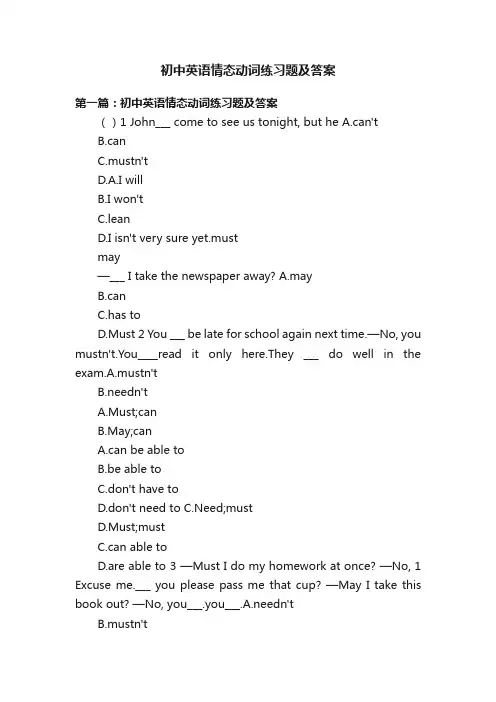
初中英语情态动词练习题及答案第一篇:初中英语情态动词练习题及答案()1 John___ come to see us tonight, but he A.can'tB.canC.mustn'tD.A.I willB.I won'tC.leanD.I isn't very sure yet.mustmay—___ I take the newspaper away? A.mayB.canC.has toD.Must 2 You ___ be late for school again next time.—No, you mustn't.You____read it only here.They ___ do well in the exam.A.mustn'tB.needn'tA.Must;canB.May;canA.can be able toB.be able toC.don't have toD.don't need to C.Need;mustD.Must;mustC.can able toD.are able to 3 —Must I do my homework at once? —No, 1 Excuse me.___ you please pass me that cup? —May I take this book out? —No, you___.you___.A.needn'tB.mustn'tC.can'tA.DoB.ShouldC.WouldD.Must A.can'tB.may notC.needn'tD.aren'tYou___ go and see a doctor at once because you're got a fever.A.canB.mustC.dareD.would—Can you speak Japanese? —No, I____.A.mustn'tB.can'tC.needn'tD.may not 1.– He___ be in the classroom, I think —No, he ___ be in the classroom.I saw him go home a minute ago.A.can;may not B.must;may notC.may;can'tD.may;mustn't —Shall I get one more cake for you, Dad? —Thanks, but you___, I've had enough.A.may not B.must notC.can'tD.needn't Even the top students in our class can't work out this problem, so itbe very difficult.A.mayB.mustC.canD.need 4 He isn't at school.I think he ___ be ill.A.canB.shallC.mustD.has to 5 ___ I take this one?A.MayB.WillC.AreD.Do 1 The children___ play football on the road.D.may not His arm is all right.He___ go and see the doctor.A.has not toB.don't have toC.haven't toD.doesn't have toHe had to give up the plan, ___ he?A.didB.didn'tC.doesD.doesn't They had to walk here, ___ they?A.mustn'tB.didC.didn'tD.hadn't He had better stay here, ___ he?A.doesn'tB.don'tC.hadn'tD.isn't 2 You'd better___late next time.A.not to be B.not beC.won't beD.don't beYou'd better ___ your hair ___ once a month.A.had;cutB.had;cuttedC.have;cutD.have;cutted 4 You___ ask that man over there.Maybe he knows the way.A.had better not toB.had not betterC.had betterD.had better not 1 —Shall we go and visit the History Museum next Sunday? —________ A.Here you areB.Sorry, I can'tC.Yes, pleaseD.Let me try —Why don't you ask Mike to go with us? —Thanks, ___.___ you like to have another try?A.CouldB.WillC.WouldD.Do 3 —Would you like to go boating with us? —Yes, ___.A.I'd likeB.I wantC.I'd like toD.I do 1 You___ worry about your son.He willget well soon.A.needn'tB.can'tC.mustn'tD.have toThe poor man needs our help, ___ he?A.needB.needn'tC.doesD.doesn't —Must we do our homework first? —No, you___.You may have a rest first.A.mustn't B.needn't C.may not D.can't 1.I told Sally how to get here, but perhaps I _______ for her.A.had to write it out B.must have written it out C.should have written it outD.ought to write it out 2.—There were already five people in the car but they managed to take me as well.—It _______ a comfortable journey.A.can’t beB.shouldn’t beC.mustn’t have beenD.couldn’t have been 3.It’s nearly seven o’clock.Jack _______ be here at any moment.A.must B.NeedC.shouldD.can 4.Johnny, you _______ play with the knife, you _______ hurt yourself.A.won’t;can’tB.mustn’t;mayC.shouldn’t;mustD.can’t;shouldn’t 5.The fire spread through the hotel veryquickly but everyone _______ get out.A.had toB.wouldC.couldD.was able to6.—When can I come for the photos? I need them tomorrow afternoon.—They _______ be ready by 12:00.A.canB.shouldC.mightD.need7.—I stayed at a hotel while in New York.—Oh, did you? You _______ with Barbara.A.could have stayedB.could stayC.would stayD.must have stayed8.—Are you coming to Jeff’s party?—I’m not sure.I _______ go to the concert instead.A.mustB.wouldC.shouldD.might9.I was really anxious about you.You _______ home without a word.A.mustn’t leaveB.shouldn’t have leftC.couldn’t have leftD.needn’t leave10.—Is John coming by train?—He should, but he _______ not.He likes driving his car.A.mustB.canC.needD.may11.A left-luggage office is a place where bags _____ be left fora short time, especially at a railway station.A.should B.canC.mustD.will12.I wonder how he _______ that to the teacher.A.dare to sayB.dare sayingC.not dare sayD.dared say13.When he was there, he ___ go to that coffee shop at the corner after work every day.A.would B.shouldC.had betterD.might14.It has been announced that candidates _____ remain in their seats until all the papers have been collected.A.canB.willC.mayD.shall15.How ______ou say that you really understand the whole story if you have covered only a part of the article?A.canB.mustC.needD.may 16.—I hear you’ve got a set of valuable Australian coin._______ I have a look?—Yes, certainly.A.DoB.MayC.ShallD.Should 【巧学活用参考答案】1.1-5 A D A B B2.1-5 C D B C A3.1-3 C A A4.1-3 D B C5.1-4 C B C C6.1-3 B A B7.1-3 C C C8.1-3 A D B 情态动词练习参考答案1.C。
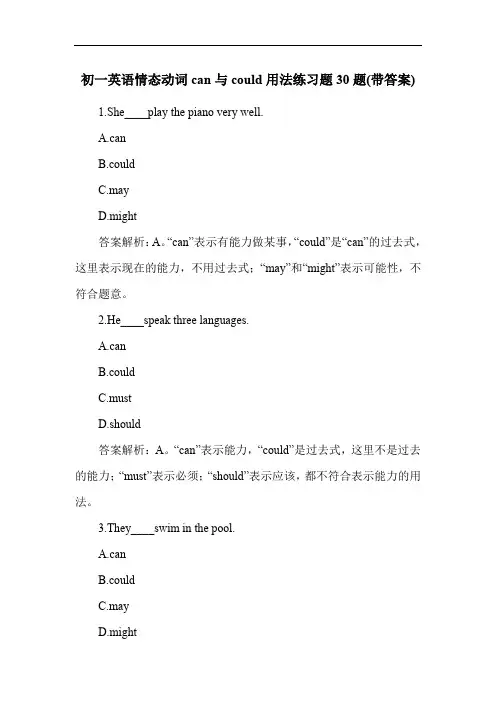
初一英语情态动词can与could用法练习题30题(带答案)1.She____play the piano very well.A.canB.couldC.mayD.might答案解析:A。
“can”表示有能力做某事,“could”是“can”的过去式,这里表示现在的能力,不用过去式;“may”和“might”表示可能性,不符合题意。
2.He____speak three languages.A.canB.couldC.mustD.should答案解析:A。
“can”表示能力,“could”是过去式,这里不是过去的能力;“must”表示必须;“should”表示应该,都不符合表示能力的用法。
3.They____swim in the pool.A.canB.couldC.mayD.might不是过去的能力;“may”和“might”表示可能性,不符合题意。
4.We____draw beautiful pictures.A.canB.couldC.mustD.should答案解析:A。
“can”表示有能力做某事,“could”是过去式,这里不是过去的能力;“must”表示必须;“should”表示应该,都不符合表示能力的用法。
5.I____ride a bike.A.canB.couldC.mayD.might答案解析:A。
“can”表示有能力做某事,“could”是过去式,这里不是过去的能力;“may”和“might”表示可能性,不符合题意。
6.She____sing many songs.A.canB.couldC.mustD.should不是过去的能力;“must”表示必须;“should”表示应该,都不符合表示能力的用法。
7.He____play basketball well.A.canB.couldC.mustD.should答案解析:A。
“can”表示有能力做某事,“could”是过去式,这里不是过去的能力;“must”表示必须;“should”表示应该,都不符合表示能力的用法。
初中英语(完整版)情态动词专项练习含解析一、选择题1.—Must the children leave at six tomorrow morning?—No, they _______. They can have more time to get ready for the trip.A.can’t B.needn’t C.mustn’t D.may not 2.When I was young, my father ___________ take me to climb the hill which was not far from our house.A.may B.must C.would D.should3.You ________ drive after drinking alcohol(酒). It’s against the law.A.mustn’t B.needn’t C.couldn’t D.wouldn’t 4.You ________ be careful with the camera. It costs!A.can B.will C.should D.may5.—Is it really necessary for me to go shopping with a mask on?—I’m afraid you ________ in public. It is not only to protect yourself but also to protect others. A.must B.should C.can D.need 6.—Could I join you in the programme?—Sorry, you ________. You are too young.A.shouldn’t B.mustn’t C.can’t D.needn’t 7.—Who is singing next door? It sounds like a young girl’s voice.—It _________ be Jane. But she seldom sings English songs.A.need B.must C.may D.can8.To avoid ________, we’d better ________ the parents’ meeting online.A.gather; hold B.gathering; hold C.gather; holding D.to gather; to hold 9.—Who’s the man over there? Is that Mr. Black?—It ________ be him. Mr. Black is much taller than that man.A.may B.must C.can’t D.mustn’t 10.—How do you like my new dress?—Well, if I ________ say, it is not suitable for you.A.may B.must C.have to D.should11.—In China, many students have to stay up late to do their homework.—No worries. The government has realized the problem. I’m sure there ________ be good news soon.A.can B.should C.must D.need 12.—There is a knock at the door.—It ________ be my mom. She always comes back home at this time.A.may B.may not C.must D.can’t13.We shouldn’t throw any objects from the building. Even a small object ________ cau se serious injuries or death, when dropped from a great height.A.must B.should C.may D.need 14.Exercise is helpful but it ________ be regular (规律的) exercise.A.must B.may C.can D.need15.You'd better __________ hard from now on, __________ you will fail the exam. A.work; and B.working; or C.working; and D.work; or 16.— Mom, must I clean my room now?— No, you ________. You can do it after dinner.A.needn’t B.mustn’t C.shouldn’t D.can’t17.— Zoe, what do you think is the greatest advantage of shopping online?— At least I ______ spend much time going from shop to shop.A.shouldn’t B.can’t C.needn’t D.mustn’t18.The boy is very brave.I ________ he ________ the tall tree.A.dare say; dares to climbB.dare to say; dare climbingC.dare saying; dares climbD.dare to say; dares climbed19.---Will you be back early this evening?---Yes, but I ________ be a little late. Our boss sometimes has extra work for us.A.may B.must C.need D.will20.—I must go to school today, ________?—No, you ________.You can go as soon as you get well.A.mustn’t I;needn’t B.needn’t I;needn’tC.mustn’t I;mustn’t D.needn’t I;mustn’t21.—Seventy dollars for such a dress! You ________ be joking!—I’m serious. It’s made of silk from Hangzhou.A.must B.need C.will D.can 22.According to the rule, used batteries ________ be dropped in the red bin for harmful wastes. A.may B.would C.should D.might23.You _________ smoke here! Look at the sign. It says "No smoking".A.needn't B.mustn't C.can D.may24.— Listen! Tom ________ be listening to the music while doing his homework.—Let’s go upstairs to remind him to turn it off.A.should B.could C.would D.must25.Never throw objects from the building. Even a small object ________ cause serious injuries, or death, when dropped from a great height.A.must B.should C.may D.need26.— Mum, why do I have to wash hands so many times a day?—You ________ be too careful, for your health.A.can’t B.mustn’t C.may not D.needn’t 27.—Will Jim come to Yangzhou for a holiday?—He ________come and it depends on how much homework he will have.A.may B.should C.must D.need28.—In China, many parents complain that their children have to stay up late to do thehomework.—Don’t worry. The government has realized the problem. I’m sure there ________ be good news soon.A.can B.should C.need D.must29.—________ I see your ID card? We have to check your personal information.—Sure. Here you are.A.May B.Need C.Should D.Must30.—Will dad arrive home at 6 o’clock to have dinner with us this evening?— I think he will, but he ________ not. Sometimes he works extra hours.A.can B.must C.need D.may31.—What is that young lady’s job?—She ________ be a nurse, I’m not sure.A.must B.may C.need D.would 32.—Must we stop the Japanese government discharging nuclear waste water (排放核污水) into the Pacific Ocean?—________. Because everyone should protect our earth and it is bad ________ us to eat the polluted seafood and drink the waste water.A.Yes, we can; of B.No, we mustn’t; of C.Yes, we must; for D.No, we needn’t; for 33.Sometimes smiles ________ be false, hiding other feelings like anger, fear or worry. A.should B.would C.must D.can34.Mr. Black ________ be at home now. He went abroad on vacation last Friday.A.can’t B.mustn’t C.needn’t D.shouldn’t 35.— The sandstorm in Beijing is so serious this year.— Yes, I wonder when we ________ worry about the air we breathe.A.can’t B.mustn’t C.needn’t D.shouldn’t36.For the safety of the passengers, objects like guns ________ be carried on board.A.may not B.needn’t C.might not D.mustn’t 37.—How beautiful the winter jasmines (迎春花) are!—Yes. These golden-yellow flowers ________ be widely seen in my city in March.A.must B.can C.would D.should 38.—Mum, I bought some strawberries on my way home.—Oh, you’re so sweet. But the strawberries ________ be put into the fridge for freshness. A.must B.can C.may D.need39.— What do you think of the show yesterday?— Some of them were really good but others ________ be better.A.will B.must C.need D.can40.I think all the students love the weekends because, to them, they ________ get up early on Saturdays or Sundays.A.mustn’t B.don’t need C.needn’t D.can’t【参考答案】一、选择题1.B解析:B【详解】句意:——孩子们明天早上六点必须离开吗?——不,他们不必。
情态动词专项练习题及答案一、初中英语情态动词1.— I take the magazine out of the reading room?— I'm sorry you .A. Could; couldn'tB. Must; couldn'tC. Will; can'tD. May; can't【答案】 D【解析】【分析】句意:——我可以把杂志带出阅览室吗?——对不起,你不能。
could 能,可以;must必须;will将;may可以;can能,可以,can't不可以,不能。
此处表示请求许可,用could或者may,由could或者may构成的一般疑问句,肯定回答用yes,主语+can,否定回答用sorry,主语+can't,结合选项,故答案选D。
【点评】考查情态动词的辨析。
注意理解句意,理解选项,根据语境,选出正确的答案。
2.— Shall I book some seats for the concert?—______. I've done that.A. Yes, you mayB. No, you mustn'tC. No, you needn'tD. No, you can't【答案】C【解析】【分析】Yes, you may是的,你可以;No, you mustn't 不,你千万不要;No, you needn't不,你不必;No, you can't不,你不能。
句意:我要预定一些音乐会的座位吗?根据下文,我已经办了。
可知选C最符合语境。
【点评】考查交际用语3.— _________ I take my cousin Shirley with us, Mr. Wu?— Yes, but we'll get there by bike. ____________ she ride a bike?— Yes, and she ___________ ride a bike when she was only six years old.A. Could; can; couldB. Can; can; canC. Can; could; couldD. Could; could; can【答案】 A【解析】【分析】句意:-我能带我表弟雪莉和我们一起吗,吴先生?-是的,但我们将骑自行车去那儿。
初中英语情态动词训练附答案一、情态动词单项选择题1.—David, you ________ wear sunglasses when you hike.—OK dad. Thanks.A.should B.shall C.might D.would【答案】A【解析】【详解】句意:——大卫,你徒步旅行时应该戴墨镜。
——好的,爸爸。
谢谢。
考查情态动词。
should应该;shall将、要;might可能;would将,will的过去式;根据“ when you hike”提示可知此处指“徒步旅行时应该戴墨镜”;故选A。
2.—Could you tell me how to renew the library books?—With pleasure. You ________ come to our desk every time. It’s easier to renew them online. A.can’t B.mustn’t C.needn’t D.shouldn’t【答案】C【解析】【详解】句意:——你能告诉我怎样续借图书馆的书吗?——非常乐意。
你不必每次都来我们前台。
在网上续借更容易。
考查情态动词辨析。
can’t不可能;mustn’t禁止;needn’t不必;shouldn’t不应该。
根据“It’s easier to renew them online”可知,在网上就能完成续借的事情,不必来前台办理,故选C。
3.Before you turn off the computer, you must ________ the document.A.save B.open C.click【答案】A【解析】【详解】句意:在你关闭电脑之前,你必须保存文件。
考查动词辨析。
save保存;open打开;click点击;根据“Before you turn off the computer, you must…he document.”及常识可知,关电脑之前先保存文件。
初中英语情态动词详细用法归纳(含练习及答案)情态动词有具体的词义, 但也同助动词一样, 需要与其他词语一起构成句子的谓语, 另外情态动词没有人称和数的变化, 情态动词后必须跟动词原形。
1.ca.的用法:(1).表示能力、许可、可能性.表示能力时一般译为“能、会”.即有种能力, 尤其是生来具备的能力.如:Sh.ca.swi.fast.bu..can’.. 她能游得很快, 但我不能。
.ca.se.wit.m.eyes.我用眼睛看。
could是can的过去式。
表示过去的能力.b.abl.t.d.sth.常常指经过努力,花费了时间和劳力之后才能做到某事。
is/am/ar.abl.t.d.sthwas/were able to do sth.(2).表示许可, 常在口语中。
如: .m.dictionary..你可以用我的字典。
(3).表示推测, 可能性, 意为“可能”.常用于否定句和疑问句中.此时can’.译为.不可能”.如:Ca.th.new.b.true.这个消息会是真的吗?—Ca.i.b.ou.teacher?那个人有可能是我们老师吗?—No.i.can’.b.ou.teacher.H.i.o..visi.t.th.Grea.Wall.不可能。
咱们老师正在游览长城呢。
【例题】—.thin.Mis.Ga.mus.b.i.th.library.Sh.sai.sh.woul.g.there.—No.Sh.__b.there..hav.jus.bee.there..A.can’.B.mustn’.C.needn’.D.wouldn’t【解析】根据下文“我刚去过那儿”可知, 应为“不可能”, can’t 表示推测[答案] Acould的用法:(1).can的过去式, 意为.能.会”, 表示过去的能力。
如: H.coul.writ.poem.whe.h.wa.10. 他十岁时就会写诗。
(2).could在疑问句中, 表示委婉的语气, 此.coul.没有过去式的意思。
情态动词专项练习(附答案)一、初中英语情态动词1.—Look! The woman at the school gate ______be her headmaster.—No, it ______ be her. She is holding a meeting in the office now.A. must; can'tB. must; mustn'tC. can; needn'tD. may; mustn't【答案】 A【解析】【分析】句意:——看!学校门口的那个妇女一定是她的校长。
——不,不可能是她。
第一空,must表示“一定”;空二,根据She is holding a meeting in the office now. 她现在正在办公室开会,可知,不可能是校长,用can't,表示不可能。
故选A。
【点评】考查情态动词辨析。
注意不同情态动词的用法,注意理解句意。
2.Teenagers allowed to drive .A. should not beB. should be notC. not should be【答案】A【解析】【分析】句意:年轻人不应该被允许驾车。
Should是情态动词,其否定表达一般在在后面加副词not,故选A。
【点评】此题考查含有情态动词的被动语态的否定形式。
平时注意记忆情态动词的记忆和用法。
3.You be tired after walking for such a long time. Sit down and have a rest.A. canB. can'tC. mustn'tD. must【答案】 D【解析】【分析】句意:走了这么长时间你一定很累了。
坐下休息一下吧。
can能,能够,can't不能,对事物进行否定推测;mustn't一定不是,禁止,must一定,对事物进行肯定推测,根据after walking for such a long time,可以肯定你一定很累,所以是进行肯定推测,情态动词使用must,故选D。
(完整版)初中英语情态动词专项练习题情态动词情态动词是一种本身有一定的词义,但要与动词原形及其被动语态一起使用,给谓语动词增添情态色彩,表示说话人对有关行为或事物的态度和看法,认为其可能、应该或必要等。
情态动词后面加动词原形。
情态动词有四类:①只做情态动词:must,can(could),may(might)……②可做情态动词又可做实义动词:need,will③具有情态动词特征:have(had,has) to,used to,ought to④情态动词表猜测:一肯一否三不定(must一肯,can not一否,may,might,could,三不定。
)注:mustn't代表强烈禁止must 表示主观,have to表示客观。
常用的有:can may could must have use .情态动词无人称和数的变化,情态动词后面跟的动词须用原形,否定式构成是在情态动词后面加"not"。
个别情态动词有现在式和过去式两种形式,过去式用来表达更加客气,委婉的语气,时态性不强,可用于过去,现在或将来。
情态动词属非及物动词,故没有被动语态。
情态动词表推测的用法小结(一)情态动词表推测的三种句式1.在肯定句中一般用must (一定),can,could(可能),might /may(也许,或许)。
e.g:(1)He must/can/may,might know the answer to this question.他一定/可能/也许知道这个问题的答案。
(2)It is cold in the room. They must have turned off the heating.屋里很冷,他们肯定把暖气关了。
2.否定句中用can’t / couldn’t(不可能),may not/mightnot(可能不)。
e.g:(1)It can’t/couldn’t be the headmaster. He has gone to America.这不可能是校长,他去美国了。
一、选择题1.This book _____ Lucy’s. Look! Her name is on the book cover.A.must be B.may be C.can’t be D.mustn’t be 2.—I’d like ________ Guo Jingming’s Tiny Times.—You had better________ his books. The stories he tells are far from real life.A.buying, don’t read B.to buy, not readC.buying, not read D.to buy, not to read3.(2018·山东临沂) Could you please speak a little louder? I ______ hear you very well. A.can’t B.mustn’tC.shouldn’t D.needn’t4.I hope you __________ to my birthday party.A.to come B.can come C.comes D.are come5.The designer has tried every possible way to make the robot light, so you _____ worry about its weight.A.must B.may C.can’t D.needn’t 6.—Can I take some milk and biscuits to the reading room?—No, our school has a rule that students _______ eat or drink there.A.can’t B.mustn’t C.needn’t D.may not7.The milk tastes bad. You’d better_______.A.throw it away B.to throw it awayC.throw them away D.to throw them away8.You should________ the teacher________being late for school.A.apology to, about B.apologize to, forC.apologies to, for D.apologize to, on9.He like coffee. I see him drink a cup at times.A.must B.may C.can’t D.mustn’t 10.—Have you heard about the temperature of the earth will rise to 59℃ in 2020?—Don’t worry! The news _______ be true.A.must not B.may not C.needn’t D.will not11.It’s raining all day, so I ________ stay at home.A.can’t B.has to C.have to12.—Must we finish the work right now?—No, you ________. You can do it tomorrow.A.needn’t B.shouldn’t C.mustn’t D.can’t13.When I write down what I am showing thanks to, it’s always for things that money______buy.A.needn’t B.shouldn’t C.may not D.can’t14.一Hurry up, Mark! Let's cross the road as quickly as possible.一No,you . Don't you see the light is still red?A.couldn't B.wouldn't C.mustn't D.needn't 15.(2017 • 湖北省宜昌市中考)—Life is becoming convenient with the Internet.—That’s true! Almost everything be done online.A.must B.would C.should D.can 16.—Must I sleep now? —No, you________.A.needn't B.mustn't C.can't D.may not 17.—Is Wilson on duty in class today?—It________be him. It's his turn tomorrow.A.must B.can't C.should D.needn't 18.—We've prepared all kinds of foods for the picnic.—Do you mean I___ bring anything?A.can't B.needn't C.mustn't D.won't19.---You look very pretty, if I say so.---Thanks a lot for saying that.A.must B.may C.will D.have to 20.Even the top student can't work out this problem, so it________ be too difficult. A.must B.may C.can D.need 21.—Could I call you by the first name?—Yes, you .A.will B.could C.may D.might22.One ______ easily lose his way when he visits or comes to a new place.A.may B.must C.need D.should【参考答案】***试卷处理标记,请不要删除一、选择题1.A解析:A【解析】【分析】【详解】试题分析:must be一定,必须;may be可能是;can’t be不能是;mustn’t be 一定不要。
联系下文,她的名字就在书的封面上。
可知这本书一定是露西的。
故选A。
2.B解析:B【解析】【详解】句意:——我想买郭敬明的《小时代》。
——你最好不要读他的书。
他讲的故事与现实生活相去甚远。
考查非谓语动词及固定句型。
短语would like to do sth.愿意去做某事;第一空排除AC;You had better+动词原形,你最好做某事;You had better not+动词原形,你最好不要做某事。
第二空排除D。
根据题意,故选B。
3.A解析:A【解析】【详解】句意:请你说大点声好吗?我不能很好地听到你说的话。
考查情态动词辨析。
can't不能,表示不能够;mustn't不许,表禁止;shouldn’t不应该,表劝诫;needn’t无需,表示没必要。
本句表示“不能够”,根据句意语境,可知BCD三项意思都与句意不合,故选A。
4.B解析:B【解析】【分析】考点:考查动词。
【详解】试题分析:句意:我希望你能来参加我的生日聚会。
hope to do sth希望做某事;hope that 从句,希望……。
但不能说hope sb to do sth;从句主语you,所以谓语动词不能用comes单数形式;come是实意动词,前面不能用are;所以选B。
5.D解析:D【解析】【分析】【详解】句意:设计者已经尝试了所有可能的方法使机器变轻,所以你不必担心它的重量。
must必须;一定;may可以;可能;can’t不能;不可能;needn’t不必,没有必要。
根据句意The designer has tried every possible way to make the robot light可知,设计者在努力使机器变轻,所以担心是没有必要的。
故应选D。
6.B解析:B【解析】【详解】句意:——我能带些牛奶和饼干到阅览室吗?——不行,我们学校规定学生不许在那里食用食物。
考查情态动词的用法。
can’t不能;mustn’t禁止,不许;needn’t不必;may not可能不。
由“a rule”可知,“学校禁止或不许学生在阅览室食用食物”。
故选B。
解析:A【解析】【详解】句意:牛奶味道不好。
你最好把它扔掉。
考查had better和人称代词宾格。
throw away意为“扔掉”,根据所给空前面的had better后面接动词原形,排除B和D,由milk是不可数名词,所以用it来代指,排除C,故选A。
8.B解析:B【解析】【详解】句意:你应该因为上学迟到向老师道歉。
本题考查动词短语。
apology道歉,是名词;apologize道歉,是动词;about关于,for为了,on在……上面。
apologize to sb for sth“因为某事向某人道歉”,位于情态动词should 后,用动词原形,故选B。
9.B解析:B【解析】【详解】句意:他可能喜欢咖啡。
我看见他有时喝一杯。
A. must必须;B. may可能;C. can’t不能;D. mustn’t禁止。
根据下文I see him drink a cup at times.可知上文是可能喝咖啡。
根据题意,故选B。
10.B解析:B【解析】【详解】句意:——你听说过2020年地球的温度将上升到59摄氏度吗?——不要担心。
那个消息可能不是真的。
考查情态动词。
must not禁止;may not可能不是。
needn’t不必;will not将不会。
根据“Don’t worry”可知,这里是这个消息可能不是真的,表示一种推测。
根据题意,故选B。
11.C解析:C【解析】【分析】【详解】句意:一整天都在下雨,因此我不得不待在家里。
考查情态动词。
can’t不能够,has to不得不,三单形式;have to不得不。
根据句意可知天下雨,所以不得不待在家里,have to符合题意,且I是第一人称,故用have to。